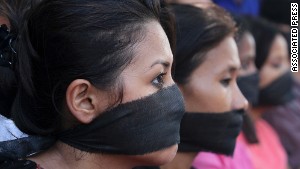16 December 2014 Last updated at 06:25
Media say rapes still India's 'biggest shame'
The Delhi bus gang rape started a nationwide debate on women's safety in India
Two years after the horrific gang rape and murder of a student in Delhi, sexual assaults against women continue to be India's biggest shame, papers say.
The gang rape of the 23-year-old medical student on a moving bus on 16 December 2012 had triggered intense protests across the country which led to the formation of stringent anti-rape laws.
The father of the victim, however, laments that "nothing" has changed since the brutal attack on his daughter two years ago, The Times of India reports.
"Nothing in India has changed... All promises and statements made by our leaders and ministers have turned out to be shallow," the paper quotes him as saying, in reference to a recent rape case in the capital.
A driver of international taxi service Uber allegedly raped a 26-year-old woman in Delhi on 5 December. More cases of rape have been reported throughout the year from different parts of the country.
'Massive gaps'
Papers feel the government's ant-rape reforms have hit many "roadblocks" and failed to effectively curb gender-based violence.
"While on paper, landmark reforms have been ushered in, many challenges have cropped up in enforcing them," The Times of India of India says in another report.
The paper adds that "the standards of investigation and prosecution set" in the 16 December case have not been "replicated in other rape cases".
Lawyer and rights activist Vrinda Grover says that the fast-track courts set up to expedite trials in cases of sexual assault have also been ineffective.
The "hollowness of the much-touted fast-track court stands exposed" as many rape victims still wait for justice, she writes in the Hindustan Times.
The Times of India adds that these courts have not been "able to deliver desired results" and also points out "massive gaps in policing and governance".
The paper says the Delhi High Court "has come face to face with systemic problems plaguing the city police and administration, such as shortage of nearly 15000 police personnel, lack of a large enough PCR [police cars] fleet."
'Patriarchal political class'
Papers also say that the mind-set of the "patriarchal" political class in the country remains incompatible with women's rights.
The DNA points out that the report of the Verma Commission, set up after 16 December 2012 to revisit laws on crimes against women, put the blame squarely on "the government, the police and even the public, for its indifference to issues related to gender".
Following the Delhi gang rape, the 630-page report was completed in 29 days and submitted to the government on 23 January 2013, which eventually led to the passing of new anti-rape laws.
The paper notes that the Commission's "proposals to make stalking and voyeurism punishable crimes" led to a debate in the parliament where some male legislators made "outright sexist statements".
Journalist Pamela Philipose writes in The Indian Express that "in time, it became clearer that the panel's most radical suggestions had been put on ice".
"Today, there are not many in government or parliament who refer to the report or show themselves as being cognisant of its recommendations," she adds.
The Verma Commission, led by ex-chief justice JS Verma, had called for faster trials and longer sentences but stopped short of recommending the death penalty in cases of sexual assault.
Columnist Ranjona Banerji, meanwhile, suggests that the "gender discourse" in the country must change.
"Although the rapists and murderers in the December 16, 2012, case have been put through the judicial system, the issue of women's safety still hangs in the balance," she writes in the The Asian Age.
Asking what we have learnt since 2012, she points out that "in the minds of some, the onus for their security and safety lies solely on women".
"We have allowed the gender discourse to become so one-sided that women who go out at night are frowned upon and women who beat up men are celebrated," she adds.
Source: http://www.bbc.com/news/world-asia-india-30490889






























